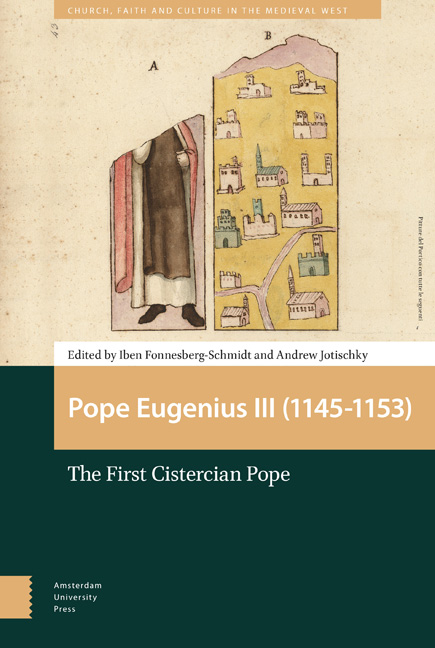Book contents
- Frontmatter
- Contents
- Preface
- Abbreviations
- Maps and Figures
- Introduction
- 1 ‘Justinian’s Laws, not the Lord’s’: Eugenius III and the Learned laws
- 2 Curial Politics and Papal Power : Eugenius III, the Curia, and Contemporary Theological Controversy
- 3 The Cistercians, Eugenius III, and the Disputed York Election
- 4 Eugenius III and the Crusades to the East
- 5 Eugenius III and the Northern Crusade
- 6 The Benefits of Exile
- 7 Eugenius III and France: the Protected Protector
- 8 A Golden Rose and the Deaf Asp that Stoppeth her Ears: Eugenius III and Spain
- 9 Eugenius III and the Roman Commune
- 10 Eugenius III Reclaims the Patrimony of St Peter
- 11 Eugenius III’s Privileges to Cistercian Houses
- 12 Eugenius III at Cîteaux, 1147
- 13 Eugenius III and the Church in the Crusader States
- Index
11 - Eugenius III’s Privileges to Cistercian Houses
Published online by Cambridge University Press: 22 December 2020
- Frontmatter
- Contents
- Preface
- Abbreviations
- Maps and Figures
- Introduction
- 1 ‘Justinian’s Laws, not the Lord’s’: Eugenius III and the Learned laws
- 2 Curial Politics and Papal Power : Eugenius III, the Curia, and Contemporary Theological Controversy
- 3 The Cistercians, Eugenius III, and the Disputed York Election
- 4 Eugenius III and the Crusades to the East
- 5 Eugenius III and the Northern Crusade
- 6 The Benefits of Exile
- 7 Eugenius III and France: the Protected Protector
- 8 A Golden Rose and the Deaf Asp that Stoppeth her Ears: Eugenius III and Spain
- 9 Eugenius III and the Roman Commune
- 10 Eugenius III Reclaims the Patrimony of St Peter
- 11 Eugenius III’s Privileges to Cistercian Houses
- 12 Eugenius III at Cîteaux, 1147
- 13 Eugenius III and the Church in the Crusader States
- Index
Summary
Abstract
Based on a study of the thirty-five surviving privileges which Eugenius III sent to Cistercian houses across Europe, this paper examines the pope's relations with the Order. It concludes that the pope did not grant excessive privileges or weaken the authority of diocesan bishops, and that in granting exemption from tithes on the products of their own labour and animal husbandry, he was following Innocent II (1130–43). Against the conclusions of Constance Berman's Cistercian Evolution (2000), the paper defends the authenticity of Innocent II's general tithe privilege of 1132 and agrees with Berman's critics in arguing that Eugenius confirmed the Carta caritatis posterior in 1152 and with it the disciplinary structure of the Order.
Keywords: Eugenius III's privileges for the Cistercian Order; Carta caritatis posterior; tithe privilege; Berman thesis
When on 15 February 1145 Eugenius III became the first Cistercian pope, the dramatic rise in the desire for papal judgments and privileges across Europe was well under way. At the same time the Cistercian Order was continuing to expand exponentially. As pope Eugenius was actively involved as a judge and an arbiter, which is significant as papal privileges often arose from the context of legal disputes. This raises several questions about the relationship between high office and affiliation with a monastic congregation. Did Eugenius act to advance the privileges of his order? Did he undermine episcopal jurisdiction by weakening the authority of the local bishop over Cistercian houses? How uniform were Cistercian privileges in this period? In considering these three questions we will also discuss the possible influence of Abbot Bernard of Clairvaux (1115–53) and whether Eugenius's membership of the Cistercians can be discerned in the privileges he granted the Order.
Some thirty-five letters to Cistercian houses survive from the pontificate of Eugenius III: eleven for England, twenty for France, two for Spain, and one each for Italy and Germany. This relatively small survival can be explained by manuscript losses and the fact that the privileges granted by Eugenius were repeated by later popes, making it unnecessary to keep records of the earlier ones. Although this paper surveys the privileges to English and continental houses, evidence will generally be drawn from the English examples.
- Type
- Chapter
- Information
- Pope Eugenius III (1145–1153)The First Cistercian Pope, pp. 305 - 320Publisher: Amsterdam University PressPrint publication year: 2018



